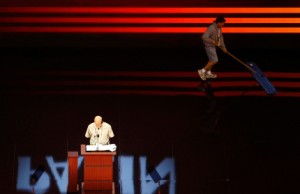 When the curtain comes down, the star of the show may take the bows, but every successful performance is the result of the coordinated, collective effort of (often) dozens of people in a wide range of positions.
When the curtain comes down, the star of the show may take the bows, but every successful performance is the result of the coordinated, collective effort of (often) dozens of people in a wide range of positions.
Everyone has a role and each role is essential.
Consider the solitary standup comic—arguably, the hardest job in show business. Even s/he needs support to be successful…
The mic has to work.
The lights have to fade up and down at the right time.
The musical play-ons and play-offs have to create a sense of urgency for the audience.
Even the guy who sweeps the stage and empties the trash has a role in a successful show. And if his job doesn’t get done right, the show just isn’t the same.
Now—imagine a Broadway production or a Vegas stage show. A not-so-small army of technicians, musicians, and craftspeople working with pinpoint precision, night after night, support the cast to execute a flawless performance. One thing goes wrong—the curtain doesn’t open or close at just the right moment, a mic feeds-back, there’s a greasy spot on the stage or the orchestra kicks-off at the wrong tempo—and the moment is lost. You don’t get a second take in a live performance… and there are a million places where the archetypal “Mr. Murphy” (from “Murphy’s Law”) can visit chaos on a production if everyone isn’t on their “A” game.
Everyone has a role and each role is essential.
Show people know this well. Backstage, there’s an incredible level of respect between departments… because everyone knows how much they depend on each other. Each person—from the star of the show to the guy who sweeps the stage—needs to…
- Understand their role
- Execute that role to perfection every time
For 8 shows a week, through 6,137 consecutive shows—the original Broadway cast and crew of “A Chorus Line” delivered flawlessly. I was there on a night when the actor who played the Morales character was struggling to sing through a cold. When it came time for her to belt out “What I Did for Love,” the sound mixer deftly dialed a little more level into her vocal monitor—giving her greater confidence and helping her avoid additional vocal strain. Other than the sound man and me (since I was standing right behind him), no one knew what he did—not the singer, not the director, not the rest of the cast and certainly not the audience. It simply made the show better… and helped save a performer’s hurting pipes.
If you’re stepping out on stage, imagine how much more confident you’ll feel if you know the technical team knows their roles and really has your back.
Rick Cornish creates communications that inform, influence and inspire… helping organizations increase sales, promote unity and persuade their people to embrace change. Working in video, corporate meetings, event marketing and more; Rick delivers purposeful creative that drives business results and builds stronger brands.

Speak Your Mind